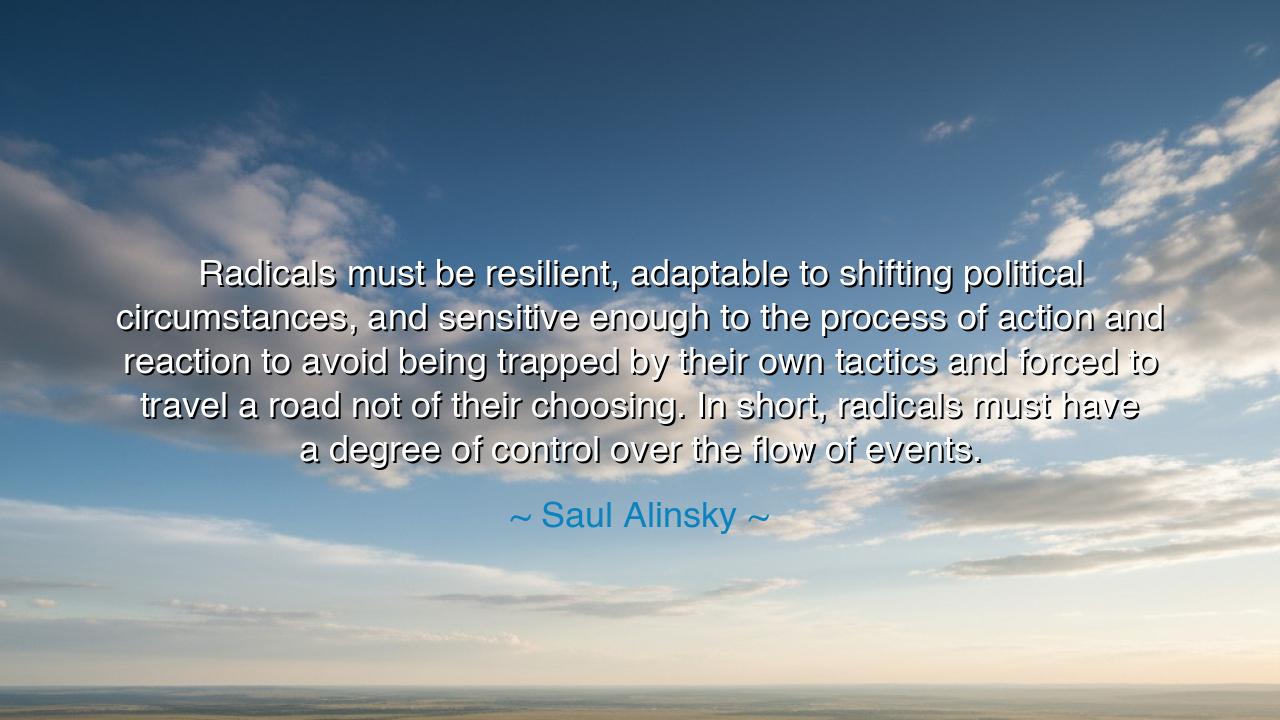
Radicals must be resilient, adaptable to shifting political
Radicals must be resilient, adaptable to shifting political circumstances, and sensitive enough to the process of action and reaction to avoid being trapped by their own tactics and forced to travel a road not of their choosing. In short, radicals must have a degree of control over the flow of events.






"Radicals must be resilient, adaptable to shifting political circumstances, and sensitive enough to the process of action and reaction to avoid being trapped by their own tactics and forced to travel a road not of their choosing. In short, radicals must have a degree of control over the flow of events." Thus spoke Saul Alinsky, master of strategy and architect of community power. His words are not simply instruction for activists; they are timeless guidance for all who would struggle against mighty systems, for all who would dare to reshape the world rather than accept its chains.
The heart of his teaching is resilience. For the radical—the one who stands at the root of change—must endure storms. Power will resist him, enemies will slander him, even allies may falter. Yet if he is resilient, like the oak that bends in wind but does not break, he can withstand the trials of struggle. To be resilient is not to be rigid, but to be rooted deeply enough that when winds of politics shift, he does not fall.
He then calls for adaptability. The radical who insists on only one method, only one road, is doomed, for the world is never still. Circumstances alter, enemies change tactics, allies shift allegiances. The wise radical must be like water—able to flow around obstacles, able to fill whatever vessel the moment demands, yet never losing his essence. This adaptability ensures he is not imprisoned by his own strategies, nor carried to defeat by clinging to outworn methods.
History is rich with examples of those who understood or ignored this truth. Mahatma Gandhi embodied adaptability, shifting from boycotts to marches, from negotiation to nonviolent resistance, always attuned to the rhythm of action and reaction. His methods were not static but alive, responding to the empire’s every move. By contrast, others who clung too tightly to a single strategy often found themselves trapped, their movements crushed under the weight of inflexibility. The lesson is clear: survival and victory belong to those who can change while remaining true to their cause.
Alinsky also warns of the danger of becoming ensnared in one’s own tactics. A movement that grows obsessed with its methods can forget its purpose. If the act of protest becomes more important than the change it seeks, the radical may be forced down a road not of their choosing—led not by vision but by inertia, compelled to repeat actions that no longer serve the cause. The wise radical must therefore remain sensitive, always asking: do these tactics still serve justice, or have they become empty ritual?
At last, Alinsky concludes with the need for control over the flow of events. To lead is not to dictate the storm, but to learn to ride its winds, to seize initiative, and to shape the rhythm of struggle. The radical who masters timing, who anticipates reactions, who turns the moves of enemies into opportunities—such a one becomes like a general who bends the battlefield to his will. Without control, movements scatter. With it, even the weakest can overcome giants.
O children of tomorrow, learn this lesson: if you would bring change, be both steadfast and fluid, strong in root yet light in movement. Do not bind yourself to one path, for the world is shifting earth. Do not fall in love with your weapons, for they are but tools. Instead, seek always the higher purpose, and let your adaptability, your resilience, and your sensitivity guide you. In this way, you will not be swept into battles not your own, but will walk the path you choose, shaping destiny rather than being dragged by it.
Thus the teaching of Saul Alinsky endures: that the true radical is not merely bold, but wise; not merely fiery, but enduring; not merely reactive, but in command. Walk this path, and when the winds of change blow fierce, you will not be carried away—you will ride them, steering toward the justice you seek.






AAdministratorAdministrator
Welcome, honored guests. Please leave a comment, we will respond soon